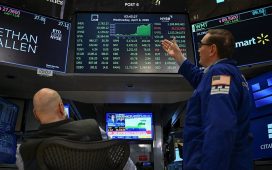US government bonds, traditionally seen as one of the world’s safest financial assets, are undergoing a dramatic sell-off as Donald Trump’s escalation of his tariff war with China sends panic through all sectors of the financial markets.
The falls suggest that as Trump’s fresh wave of tariffs on dozens of economies came into force, including 104% levies against Chinese goods, investors are beginning to lose confidence in the US as a cornerstone of the global economy.
The yield – or interest rate – on the benchmark 10-year US Treasury bond rose by 0.16 percentage points on Wednesday to 4.42%, its highest since late February – and this week has undergone the three biggest intraday moves since Trump was elected in November. Yields move inversely to prices, so surging yields mean falling prices as demand drops.
The move in the 30-year bond was more dramatic. The 30-year yield briefly jumped above 5% to its highest since late 2023 and was last trading at 4.9157%, or 0.2 percentage points higher than Tuesday.
“This is a fire sale of Treasuries,” said Calvin Yeoh, portfolio manager at the hedge fund Blue Edge Advisors. “I haven’t seen moves or volatility of this size since the chaos of the pandemic in 2020,” he told Bloomberg.
Analysts believe the US Federal Reserve may need to step in. Jim Reid, at Deutsche Bank, said: “Markets are pricing a growing probability of an emergency [interest rate] cut, just as we saw during the Covid turmoil and the height of the GFC [global financial crisis] in 2008.”
UK bonds were also under severe pressure after the US moves. The yield on a 30-year UK gilt hit 5.518% on Wednesday morning, up 16 basis points and surpassing a previous 27-year high of 5.472% set in January.
Shorter-dated 10-year gilt yields were slightly higher at 4.69% while two-year yields ticked down at 3.92%.
Higher yields on gilts – UK government bonds – will make things even more difficult for Downing Street, as it will raise the cost of borrowing to fund investment.
China’s intransigence in the face of escalating US tariffs appeared to show the world’s two largest economies heading for a showdown with an outcome that analysts said was difficult to predict.
“When challenged, we will never back down,” said China’s foreign ministry spokesperson, Lin Jian. The commerce ministry said: “China will fight to the end if the US side is bent on going down the wrong path.” Further countermeasures have been promised by Beijing.
after newsletter promotion
It was not clear whether China, which is one of the world’s largest holders of Treasuries, included among its policy changes the sale of those bonds, which would increase the US administration’s financial pain.
Global stock markets are suffering another tumultuous day as the tariffs take effect.
Japan’s Nikkei benchmark index closed down almost 4%, while Taiwan’s benchmark stock index was 5.8% lower. Hong Kong’s Hang Seng index recouped some earlier falls to close 0.4% down, and South Korea’s Kospi 200 index dropped by 1.8%.
However, China’s stock markets rose, appearing to weather the storm after government interventions. The SSE composite index in Shanghai ended the day 1.1% higher, while the Shenzhen SE composite rose 2.2%.
In Europe, the major markets slumped in the opening trades on Wednesday. In London, the FTSE 100 dropped by 2.2% in early trades on Wednesday, immediately undoing most of the gains on Tuesday. Germany’s Dax index dropped by about 2.3%, while France’s Cac 40 fell by 2.4%. Spain’s Ibex index was down by 2%.












